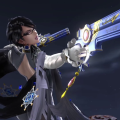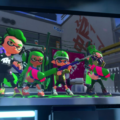Cognition Dissemination: Are Bayonetta and The Wonderful 101 Really Coming to Switch?

Over the last week, there’s been one big question surrounding the gaming universe (among a few others): Are three PlatinumGames titles actually coming to Switch? It’s tough to tell for sure.
The fun started when PlatinumGames opened their Japanese Twitter account by posting a dual picture showing Bayonetta’s appearances from the first and second games. While it’s rudimentary that a developer would share artwork of their biggest franchise for such an occasion, the colors associated with the Bayonetta portraits stuck out. Bayonetta from Bayonetta 2 is shown with a blue background on the top, while Bayonetta from the first game is shown with a red one, which many noticed matched the colors of the Neon Blue and Red Switch Joy-Con. This was topped off by how the account “liked” several tweets that mentioned Switch in their replies, which made it appear these hints couldn’t be more overt.
The tweet has also since been pinned on the account, to further increase awareness of it.

A hint at another port came when the account posted an image featuring chibified character models meant to resemble their staffers playing a blurred-out game on the television. That game? You don’t even have to squint too hard to see that it’s The Wonderful 101, which originally released on Wii U in 2013. Those aforementioned staff models are also facsimiles of characters from that game, and one is meant to resemble director and frequent Twitter-blocker Hideki Kamiya. Both Kamiya and another staffer are playing the game with Switch Joy-Cons designed after an original Famicom controller. Once again, they’re laying the hint on thick.
The ostensibly easy takeaway here is that all three games will be making their way to Switch. But you may want to hold off on definitively claiming the ports are happening, as we could be reading too much into these.
While the Bayonetta tease looks definitive, the backgrounds for both iterations of Bayonetta match the colors of their guns. Bayonetta’s gun was red in the first game, but blue in the second game. If this isn’t teasing Switch versions of both games, it will be one of the cruelest video game-related non-teases in recent memory. We could also be looking too far into the tease for The Wonderful 101, too, which could simply be a fun picture for fans of the game and company.
They could be red herrings, but this could also be their way to try and goad Nintendo and Sega into green lighting the ports, after they’ve undoubtedly heard demand for them. Keep in mind PlatinumGames doesn’t own any of the properties they work on, at least not yet.

I hope these clues are indeed for ports, as though the original Bayonetta is reaching a new audience through the recently-released Steam version thanks to Sega, Bayonetta 2 and The Wonderful 101 could do the same. The last two games there are partially and entirely owned by Nintendo, respectively, which previously released only on Wii U. Given that Switch is still selling to the point that Nintendo can’t meet demand over four months after launch, the games could reach those who never purchased a Wii U — like me, for instance.
Additionally, Nintendo of America’s Reggie Fils-Aime mentioned shortly after E3 that more ports could be on their way to Switch, and he could be referring to these games. If they’re coming, it would make sense that they weren’t announced at E3. There, Nintendo was focused on showing new titles that will further establish Switch as an appealing console full of brand-new titles, perhaps in preparation for a time when they can meet demand for the system. Announcements of ports and other titles could be saved for a Nintendo Direct focused on games not internally developed by Nintendo themselves.
Though Bayonetta 2 wasn’t the highest seller, the presence of Bayonetta in the newest Super Smash Bros. made me think Nintendo wanted to keep the character around for future opportunities — beyond ports. This could be the first part in a plan to gauge interest in sequels to these titles, and determine whether they’d sell enough for successors to be viable. If not, perhaps Nintendo wants to keep PlatinumGames around as a reliable partner for future titles, to either work on another original property or a new title in a Nintendo-owned franchise. Either way, PlatinumGames could use the work, especially if they haven’t found another big project to work on after the cancellation of Scalebound.
We’ll find out whether these clues are accurate or if PlatinumGames simply wanted to play a little game with their fans in the near future. If it’s the latter scenario, they’d better figure out how to let them down easy, because they’ll undoubtedly feel their rage otherwise.





